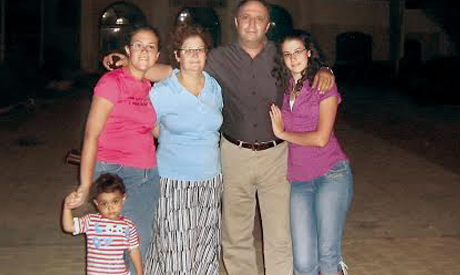
Nashed Fekry and his family
As the Easter holiday commences and Egyptian Coptic Christians partake in festivities, attending church services and feasting, Nashed Fekry expresses his grief during the holiday season.
Fekry lost his entire family in the bombing of the Two Saints Church in Alexandria on 1 January 2011 – an attack that killed over 20 people and injured around 100.
“I have no family, I am spending Easter in Saint Mina Monastery, where my late wife, Sonia, two daughters, Martina and Mariam, and my sister-in-law are buried,” explained a melancholic Fekry with a quavering voice, adding that this has become his normal Easter routine since the tragedy.
The bodies of all those killed in the bombing are buried in the Saint Mina monastery in Mariout, near Alexandria. The deadly attack occurred just after midnight following the New Year's Mass. Initial reports declared it was a car bomb, although the interior ministry later confirmed that a suicide bomber was responsible. It was the most brutal attack against the Coptic minority since the 2000 massacre in the Upper Egyptian village of Al-Kosheh, where 21 Copts were slaughtered in three days of sectarian violence.
Lonely at Easter
Fekry intends to end his self-imposed solitude at the monastery on Easter Monday. He will then spend time with his remaining family, his nieces and the last surviving of his two sisters, and visiting the destitute. Nonetheless, his void cannot be diminished, as memories remain of how he used take his daughters to church and parties during the feast.
Emotionally distraught, Fekry relies on his faith and the love and attention of the friends of his deceased wife and daughters for support during Easter and throughout the year.
“After I lost my family, I had nothing to live for. But God and people’s love saved me. Over 2,000 people now call me father,” described Fekry, referring to the Facebook group that compassionate youths created in loving support.
Fekry, a former HR manager for ASEA Brown Boveri (ABB), now in his mid fifties, resigned from his post in August 2012 to work as a fulltime volunteer at the Two Saints Church. He justified his decision in conjunction with the shift in his life target, which was previously as the breadwinner for his family and is now serving others. Fekry’s support network describes him an “an example for all humanity” given his devotion to serving others despite his circumstances.
Lack of Accountability
Witnesses to the atrocity, including Fekry, hold the Muslim Brotherhood liable, referring to the organisation’s history of violence and alleged links to terrorist factions, including the Army of Islam. The widower also draws links with the homemade device utilised in the explosion and ongoing attacks, such as the assassination attempt on Interior Minister Mohamed Ibrahim, which the state blamed on the Brotherhood.
Officially, no links have been proven between the Brotherhood and the Two Saints Church bombing.
“My sole wish for Easter and for 2014, is for the criminals, who I believe are aligned to the Brotherhood, to be found and tried,” said Fekry.
The Egyptian authorities have made similar accusations linking the attacks to various militant Islamist currents, yet little has been achieved.
Following the attack, president Hosni Mubarak laid accountability on "foreign elements" and pledged to catch the perpetrators. While interior minister Habib El-Adly blamed the Gaza-based Army of Islam, and the governor of Alexandria, Adel Labib, accused Al-Qaeda. Under Islamist president Mohamed Morsi, the issue was ignored.
Despite state and witness allegations, to date nobody has been brought to trial. Accordingly the Coptic Church has threatened to sue the interior ministry. Although many Christians doubted the perpetrators would be pursued under either Mubarak or Morsi, new hope is expressed with the future government.
“If Sisi is elected president, I believe he will re-open the case and justice will be served at last,” said Fekry.
Short link: